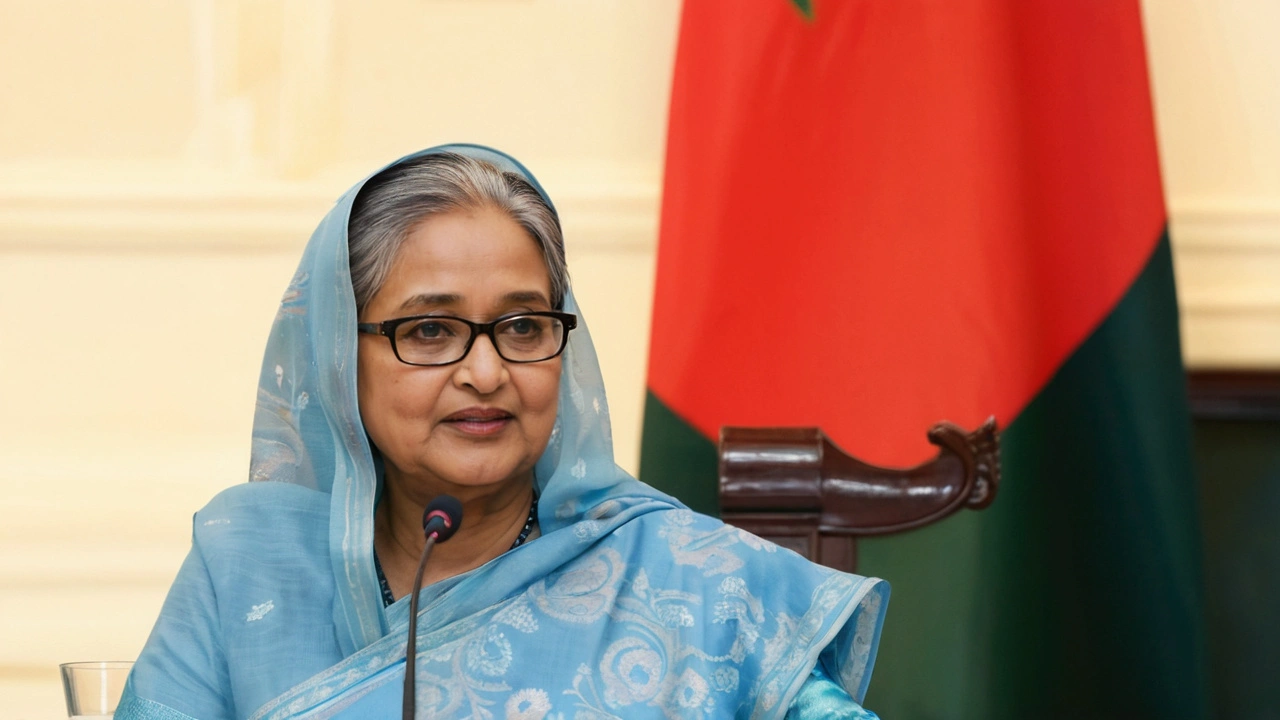Protests Erupt Leading to Major Political Shift
The political landscape of Bangladesh has been dramatically altered following the resignation of Prime Minister Sheikh Hasina. The news of her resignation broke amidst intense protests that saw thousands of demonstrators storm the presidential palace in the capital city, Dhaka. The protesters, who have been increasingly vocal, accused Hasina of corruption and economic mismanagement, setting off a chain reaction of events that ultimately led to her fleeing the country.
Backdrop of Allegations and Growing Discontent
The roots of the current turmoil can be traced back to a series of allegations and claims against Hasina and her government. These allegations included mismanagement of the economy, which has seen significant challenges such as rising inflation and unemployment rates. Additionally, there were reports of widespread corruption at various levels of government, further fueling public distrust and anger. As the economic situation worsened, it gave rise to a growing movement demanding accountability and change.
Protests Gain Momentum
The protests, which initially began as smaller gatherings, quickly gained momentum as more people joined the movement. The demonstrators, coming from diverse backgrounds, were unified in their call for Hasina's resignation. The scenes from Dhaka showed large crowds converging towards the presidential palace, chanting slogans and holding signs. The situation quickly escalated, with clashes erupting between protesters and security forces. Tear gas and rubber bullets were deployed as authorities struggled to maintain control.
Hasina's Controversial Claims and Departure
In her final address before stepping down, Hasina made a startling claim that she had been offered a deal by a 'white man.' This deal allegedly promised a smooth re-election in exchange for allowing a foreign airbase in Bangladesh. This revelation added another layer of complexity to the unfolding events. Hasina's departure marked the end of her tenure, which began in 2009, and left a nation grappling with uncertainty about its future leadership.
Clashes and International Response
The clashes between protesters and security forces resulted in numerous injuries on both sides. Videos circulating on social media showed the extent of the chaos, with fires breaking out in some parts of the city and barricades being erected. The international community has been closely monitoring the situation. Organizations such as the United Nations have called for calm and urged both sides to engage in peaceful dialogue. The UN Secretary-General released a statement expressing concern over the escalating violence and emphasizing the need for a resolution that respects democratic principles.
Uncertain Political Future
With Hasina's sudden departure, Bangladesh faces a period of significant uncertainty. Various opposition groups have begun to mobilize, each vying for influence and the chance to establish a new government. This power vacuum presents a critical juncture for the nation, where different political factions and interest groups will likely seek to assert their dominance. Analysts warn that the coming days and weeks will be crucial in determining the direction of Bangladesh's political landscape.
Public Sentiment and Hope for Change
The public sentiment in Bangladesh is a mix of anger, hope, and apprehension. While many are relieved to see the end of Hasina's rule, there is also a palpable sense of uncertainty about what lies ahead. Citizens are hopeful that the next phase will bring about meaningful change, addressing the issues of corruption and economic mismanagement that have plagued the nation. However, there are fears that the power struggle might lead to unrest and further destabilization.

The Road Ahead
The road ahead for Bangladesh is fraught with challenges and opportunities. As the country stands at this pivotal moment, the actions taken by both national and international actors will be crucial in shaping its future. Bangladesh's neighbors and key global players will likely watch developments closely, recognizing the strategic importance of stability in the region. For now, the immediate focus remains on maintaining order and ensuring a peaceful transition of power.
In conclusion, the resignation and flight of Sheikh Hasina mark a significant turning point in Bangladesh’s history. The wave of protests that led to this outcome reflects widespread dissatisfaction and the desire for a new direction. As the nation navigates through this turbulent period, the world watches with keen interest, hoping for a resolution that will bring stability and progress to Bangladesh.

Kim Chase
August 5, 2024 AT 18:17Wow, the unrest in Dhaka is absolutely wild right now. I cant help but think about how quickly a crowd can turn into a movement when people feel unheard. The resignation of a leader who's been in power for over a decade is a huge shock to the system, but also an opportunity for a fresh start. Its important that we keep an eye on how inclusive the transition will be, especially for marginalized voices. Hopefully the next steps prioritize dialogue and avoid more bloodshed.
David Werner
August 29, 2024 AT 04:53The moment the first protest erupted in Dhaka, the hidden gears of global power began to turn, and the world never saw what was about to unfold! For years, shadowy elites have been feeding the Bangladeshi bureaucracy with covert cash, ensuring that any dissent would be snuffed out before it could blossom. The sudden resignation of Sheikh Hasina is no accident; it is the culmination of a meticulously orchestrated plan involving foreign intelligence agencies and multinational corporations hungry for a strategic foothold. Whispers of a secret deal with a so-called "white man" were not just idle gossip-they were the coded language of a transaction that would grant a foreign airbase unprecedented access to the Indian Ocean. The protests, which seemed spontaneous, were actually synchronized with cyber-operations that flooded social media with false narratives designed to inflame the masses. Every tear gas canister, every rubber bullet, was pre-positioned by operatives who had studied the city’s layout for months. The UN's call for calm reads like a façade, a diplomatic script rehearsed behind closed doors while the real agenda moves forward unchecked. The opposition groups mobilizing now are being funneled through shadow networks that will later dictate policy in exchange for lucrative contracts. The economic mismanagement blamed on Hasina is a smokescreen, a diversion from the massive resource extraction deals that were about to be signed under her watch. Look at the sudden spikes in commodity prices; they align perfectly with the timing of the protests, suggesting market manipulation to destabilize the government. Even the alleged foreign airbase talk is a misdirection-what's really being negotiated is a surveillance hub that will monitor communications across South Asia. The common people, driven by genuine grievances, are being weaponized as pawns in a grand geopolitical chess match. The bloodshed, the arrests, the chaotic streets-all are rehearsed scenes in a drama scripted by powers that prefer a pliable Bangladesh over a sovereign one. As the dust settles, the true beneficiaries will be those hidden investors who will reap the rewards of a compliant regime. Wake up, the world is watching, and the next chapter is already being written in secret meetings that no one will ever see.
Paul KEIL
August 29, 2024 AT 05:10Strategic realignment protocol indicates systemic vulnerability exploitation through covert asset allocation leverage without direct attribution.
Horace Wormely
September 10, 2024 AT 22:26The piece incorrectly refers to the "presidential palace" when the official name is Bangabhaban.
christine mae cotejo
October 4, 2024 AT 02:00The cascade of events following Sheikh Hasina’s resignation is a stark reminder that political longevity does not guarantee stability, especially when governance is perceived as detached from the populace’s daily struggles. In Bangladesh, decades of incremental economic growth have been shadowed by rising inflation, which has eroded purchasing power for ordinary families and amplified frustration across urban and rural divides. While the protests were sparked by immediate grievances, they also embody a broader yearning for transparency, accountability, and a reimagined social contract that truly reflects citizen aspirations. Historical precedents in South Asian politics show that abrupt power vacuums can either descend into chaos or pave the way for reformist coalitions, depending on how swiftly inclusive dialogues are instituted. International observers, including the United Nations, have called for restraint, yet the on-the-ground reality demands more than vague admonitions-it requires concrete mechanisms for transitional governance, perhaps in the form of a caretaker cabinet drawn from multiple party lines. Moreover, the alleged foreign involvement, whether real or perceived, adds a layer of complexity that could either be leveraged to galvanize national unity or be exploited to sow further division. Civil society organizations must seize this moment to advocate for robust anti-corruption frameworks, independent judiciary reinforcement, and economic policies that prioritize equitable growth. Ultimately, the trajectory Bangladesh will follow hinges on the collective resolve of its leaders, activists, and ordinary citizens to transform protest energy into constructive, policy-driven change.
Douglas Gnesda
October 4, 2024 AT 03:23Great synthesis! To operationalize those anti-corruption frameworks, we could adopt a multi-tiered compliance model that integrates blockchain-enabled transparency with real-time audit trails, ensuring each public fund allocation is traceable down to the district level. Additionally, aligning fiscal stimulus with green infrastructure projects could address both unemployment and climate resilience, creating a synergistic policy win. Implementing such mechanisms in the Chittagong economic zone as a pilot would provide tangible data for scaling nationwide.
Abhijit Pimpale
October 21, 2024 AT 10:40Bangladesh's current inflation rate stands at roughly 12.5%, a figure that directly impacts consumer price indices across all major commodities.
Eric DE FONDAUMIERE
October 27, 2024 AT 04:33Wow, thats a huge number! If the gov can get that down even a couple percent, everyday folk will feel the relief instantly. Lets hope the new team grabs the econ wheel fast.